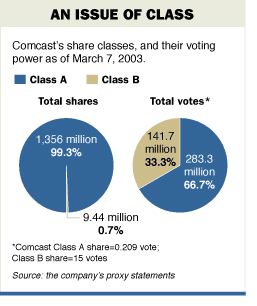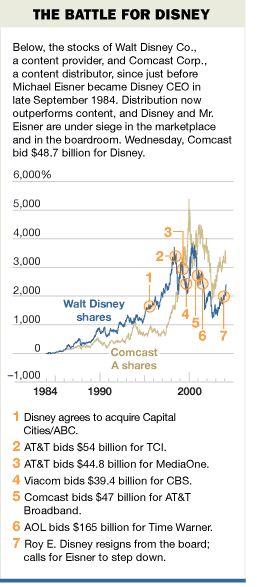Will Comcast Get Its Trophy?
Already, Speculation Is Swirling Over Rival Bidders for the Mouse;
One Notion Is Mr. Gates at the Gate
By KEN BROWN, MARTIN PEERS and ROBIN SIDEL
Staff Reporters of THE WALL STREET JOURNAL
Comcast Corp.'s Philadelphia Flyers are riding high in first place in their
National Hockey League division while Walt Disney Co.'s Mighty Ducks languish
in last, a big fall for last year's Stanley Cup finalists.
The same might be said for the teams' parents. Facing an unsolicited takeover
bid from Comcast, Walt Disney, once a contender, is facing a hot young team
that has very quickly exposed Disney's defense as weak and its options limited.
 In defending itself against Comcast's $48.7 billion offer, Disney's management
certainly can't boast of its own effectiveness -- the company's shares are
trading right where they were six years ago and earnings have been effectively
flat for a decade.
In defending itself against Comcast's $48.7 billion offer, Disney's management
certainly can't boast of its own effectiveness -- the company's shares are
trading right where they were six years ago and earnings have been effectively
flat for a decade.
Comcast's real concern is less Disney itself than other rivals swooping in
for its trophy. Among the potential entrants who could make a play for Disney
are Barry Diller's InterActiveCorp., John Malone's Liberty Media Corp., Sumner
Redstone's Viacom Inc., Rupert Murdoch's News Corp., and perhaps even Bill
Gates's Microsoft Corp. They all have done far more media deals than Comcast
CEO Brian Roberts and have strong incentives not to let Disney fall into the
hands of a cable company.
Disney quickly hired Goldman Sachs Group Inc. and Bear Stearns Cos. to help
it fight Comcast. It needs all the help it can get. The company has unusually
weak takeover defenses, lacking even a so-called poison pill, a very common
mechanism that makes it prohibitively expensive for a hostile bidder to acquire
a large number of shares. In addition, Disney's entire board is elected every
year, meaning they could be easily replaced, and Comcast can throw the board
out in a written consent solicitation, sort of like a write-in campaign, with
just a simple majority of the shares outstanding.
"They are not nearly as well defended as some of their peers," says
Jim Mallea, vice president at TrueCourse, a financial-research firm that specializes
in data about corporate-takeover defenses.
Disney does have a few cards to play in an effort to control its own fate,
say investors. It can own up to its weak performance and dump Chairman and
Chief Executive Michael Eisner, who has incurred the wrath of investors and
two former board members, including Roy E. Disney.
 "I like Disney's assets, I just don't like Disney's management," says
Ned Dewees, a portfolio manager at Douglas C. Lane and Associates, a New York
money manager which owns shares of Disney. Or Disney can argue that its own
corporate governance, which has been upgraded recently, is far superior to
Comcast's where the Roberts family controls the company through supervoting
shares.
"I like Disney's assets, I just don't like Disney's management," says
Ned Dewees, a portfolio manager at Douglas C. Lane and Associates, a New York
money manager which owns shares of Disney. Or Disney can argue that its own
corporate governance, which has been upgraded recently, is far superior to
Comcast's where the Roberts family controls the company through supervoting
shares.
Disney's improved corporate governance could backfire on Mr. Eisner. In one
improvement, Disney hired former U.S. Sen. George Mitchell to be its presiding
director. Mr. Mitchell, who has become one of Disney's public faces, has the
credibility to stand up to Mr. Eisner. In addition, good governance means maximizing
shareholder value, and turning down a reasonable offer would demolish Disney's
good-governance credentials.
If Disney does stick with Mr. Eisner and argues that its pristine corporate-governance
structure would be ruined by Comcast, it will have a tough task ahead of it.
First, many investors don't believe Disney's claims. "They are not the
bastion of corporate governance, they never were," Mr. Dewees said. "So
now they get a C instead of a D." Critics of Disney's governance cite
high executive compensation, Mr. Eisner's entrenched leadership and a board
that until recently was closely allied with management.
Second, AT&T Corp. made the same argument when Comcast was trying to get
its cable assets in 2001, and investors ignored the move. "I don't think
it's easy to pick on Comcast because institutional shareholders have found
a way to live with it," said one person familiar with the matter.
Finally, the media industry is the land of bad corporate governance, so Comcast
doesn't stand out. For example, several major companies including Liberty and
Viacom have supervoting rights, giving their top executives control of the
company.
In any case, Disney's initial strategy likely will be to shift the debate
away from Mr. Eisner, who has become a lightning rod for criticism, and shift
it to the company's recently improving performance. At its analysts' conference
in Orlando, Fla., this week, it plans to stick to the original agenda as a
sign that the company is stable and not cowering. Mr. Eisner Wednesday night
circulated casually at a dinner with the analysts, though he wasn't talking
about Comcast.
Should Disney's board succeed in moving the spotlight away from Mr. Eisner,
takeover experts say it should have an easier time rebuffing Comcast by pointing
out to investors that the offer is too low.
One senior media executive suggested Wednesday that Mr. Eisner could look
to do a big acquisition to stave off Comcast. He could negotiate to buy a company
for stock, putting a big block of stock in friendly hands. But that strategy,
known in takeover circles as a "scorched earth" defense, is risky
because shareholders often view such a move as a sign of entrenchment. Such
an arrangement may involve Mr. Eisner agreeing to let the target company's
CEO take over management of Disney while allowing Mr. Eisner to stay on as
chairman of 18 months or so. That way Mr. Eisner would be able to block Comcast's
bid and step down on his own terms.
While Disney's defense may be weak, other rivals could spoil Comcast's victory
party. Indeed, Disney shares jumped 15% Wednesday, signaling that investors
believe a better bid is coming from Comcast or someone else.
There aren't many media companies that could buy Disney, but those that could
include Liberty Media, InterActiveCorp., Viacom and News Corp., as well as
Time Warner Inc. or even Microsoft.
The first to bow out was News Corp.'s Mr. Murdoch, whose company just bought
satellite provider DirectTV. "We certainly would not be making a run at
Disney," Mr. Murdoch said in a conference call.
Investors and industry insiders also discounted bids from Mr. Redstone's Viacom,
which owns the CBS television network and would have regulatory problems buying
Disney, which owns ABC. A person close to Viacom also ruled out a bid, noting
the only Disney asset of any interest to Viacom is ESPN.
Time Warner is just digging itself out from balance-sheet and accounting problems,
and the big European media companies are all struggling with the same issues,
likely eliminating them as contenders. Time Warner wouldn't comment.
The big speculation centered on a joint bid by Messrs. Malone and Diller,
of Liberty and InterActiveCorp. Mr. Diller is close with Mr. Eisner and could
come in as a white knight. Both executives have the heft and balance sheets
to buy Disney. Mr. Diller and a Liberty spokesman both declined to comment.
A potential bid from Microsoft would be shocking. But given the company's
big cash hoard and longstanding moves into content, it could make sense. But
a move such as that likely would lead to some breakup of Disney, sending analysts
scrambling to figure out what the pieces were really worth.
Meanwhile, Disney and Comcast both reported earnings Wednesday (see related
article). Comcast returned to a fourth-quarter profit from a year-earlier loss,
as revenue surged 58% on an increase in digital-cable subscribers.
The cable giant turned in consolidated net income of $383 million, or 17 cents
a share, in contrast to a year-earlier net loss of $51 million, or three cents
a share. Consolidated revenue soared to $4.74 billion from $3 billion.
Disney rushed out its earnings after Comcast's takeover bid, delivering a
stronger-than-expected fiscal first quarter, fueled in part by strong DVD sales
of hits from its movie studio including "Finding Nemo" and "Pirates
of the Caribbean: Curse of the Black Pearl."
Disney forecast earnings growth of more than 30% for fiscal 2004, and Mr.
Eisner said he was targeting double-digit earnings growth through at least
2007.
For the quarter ended Dec. 31, Disney reported net income of $688 million,
or 33 cents a share, compared with $36 million or two cents, a year earlier.
The write-off of a lease investment reduced year-earlier results by four cents
a share. Revenue climbed to $8.55 billion from $7.17 billion a year earlier.
Write to Ken Brown at ken.brown@wsj.com, Martin Peers at martin.peers@wsj.com
and Robin Sidel at robin.sidel@wsj.com
 In defending itself against Comcast's $48.7 billion offer, Disney's management
certainly can't boast of its own effectiveness -- the company's shares are
trading right where they were six years ago and earnings have been effectively
flat for a decade.
In defending itself against Comcast's $48.7 billion offer, Disney's management
certainly can't boast of its own effectiveness -- the company's shares are
trading right where they were six years ago and earnings have been effectively
flat for a decade. "I like Disney's assets, I just don't like Disney's management," says
Ned Dewees, a portfolio manager at Douglas C. Lane and Associates, a New York
money manager which owns shares of Disney. Or Disney can argue that its own
corporate governance, which has been upgraded recently, is far superior to
Comcast's where the Roberts family controls the company through supervoting
shares.
"I like Disney's assets, I just don't like Disney's management," says
Ned Dewees, a portfolio manager at Douglas C. Lane and Associates, a New York
money manager which owns shares of Disney. Or Disney can argue that its own
corporate governance, which has been upgraded recently, is far superior to
Comcast's where the Roberts family controls the company through supervoting
shares.